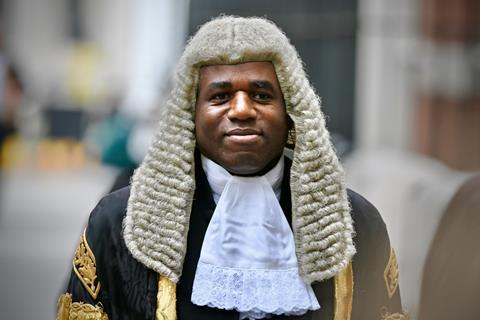Lord chancellor David Lammy is reportedly planning to scrap jury trials for all but the most serious cases - which would be a ‘step too far’ to cut the Crown court backlog, the Law Society has warned.
In a memo leaked to The Times, Lammy told ministers and civil servants that rape, murder, manslaughter and ‘public interest’ cases would be heard by a jury. Less serious offences would be heard by a judge alone.
The government has yet to publish its response to Sir Brian Leveson's independent review of the criminal courts system. In his first report in July, the former Queen's Bench Division president recommended the establishment of a Crown Court Bench Division where less serious cases would be heard by a judge flanked by two magistrates. Lammy reportedly wants to scrap the magistrate element.
Law Society president Mark Evans said: ‘Leveson’s report made clear the complexity of the situation and the need for investment and reform across the entire criminal justice system, which is currently failing the public it serves… The Leveson proposals were an uncomfortable compromise, only justifiable given the extensive challenges our justice system faces. To go beyond Leveson’s proposals is a step too far. With a sensible combination of funding and structural change, the government can solve the criminal courts backlog without resorting to extremes.’
A Ministry of Justice spokesperson said: ‘No final decision has been taken by government. We have been clear there is a crisis in the courts, causing pain and anguish to victims - with 78,000 cases in the backlog and rising - which will require bold action to put right.’

Read more
Scrapping jury trials for all but the most serious cases would be a surprising move from a lord chancellor who praised the jury system in his 2017 landmark review of the treatment of black, Asian and minority ethnic people in the criminal justice system.
The review described juries as a 'success story' of the criminal justice system: 'Rigorous analysis shows that, on average, juries - including all-white juries - do not deliver different results for BAME and white defendants. The lesson is that juries are representative of local populations - and must deliberate as a group, leaving no hiding place for bias or discrimination.
Lammy also said a 'step change' was needed in the divesity of the magistracy and especially the judiciary. 'Until this is achieved, there will continue to be a pervasive sense of "them and us" among BAME defendants,' the 2017 review said.
This article is now closed for comment.






























32 Readers' comments